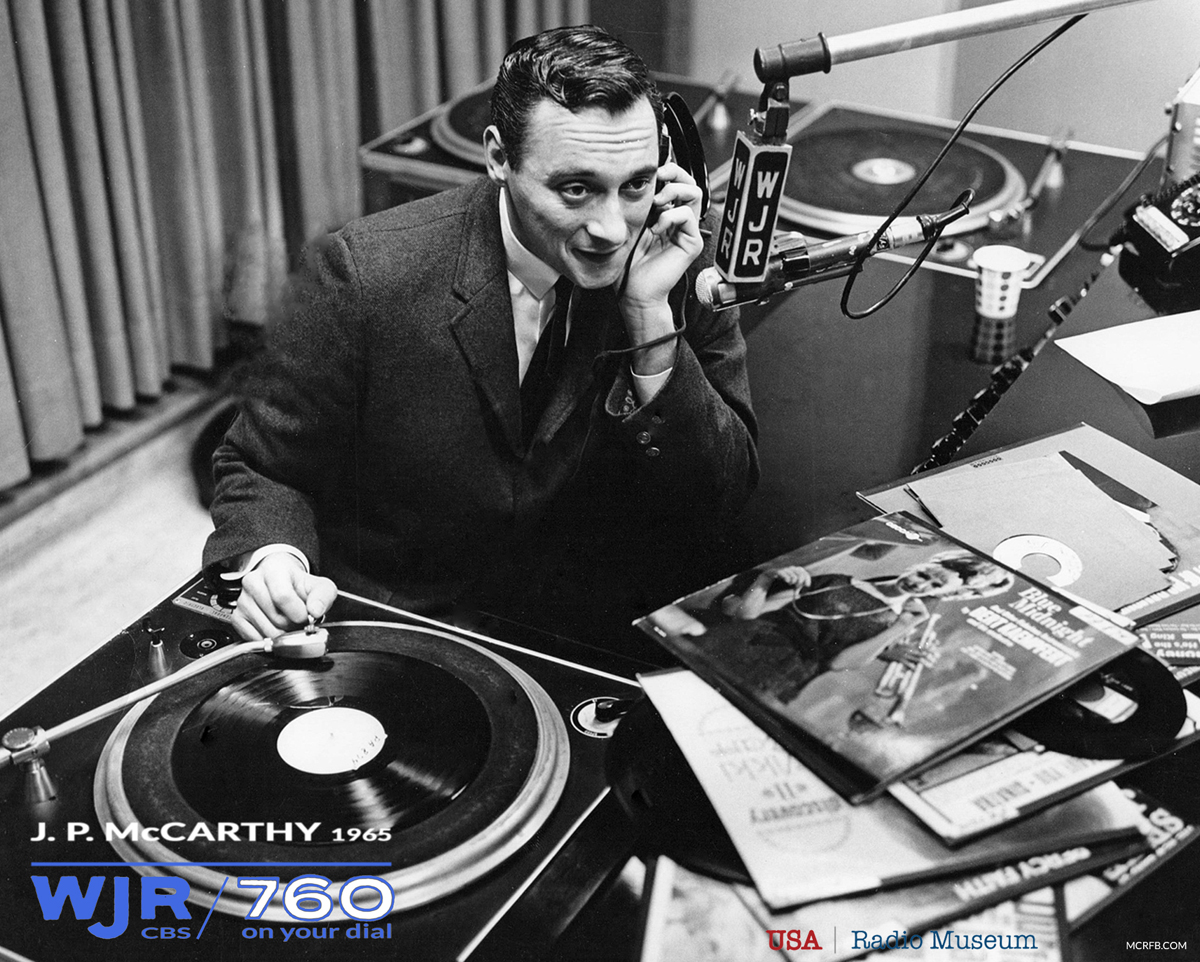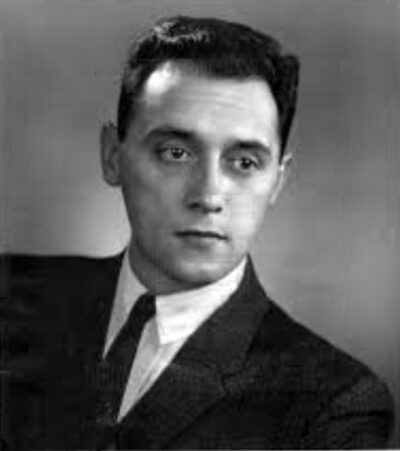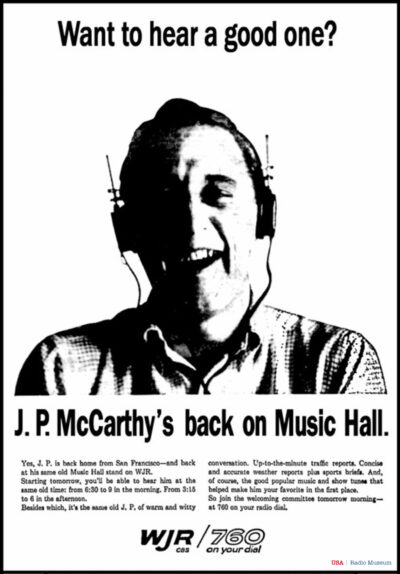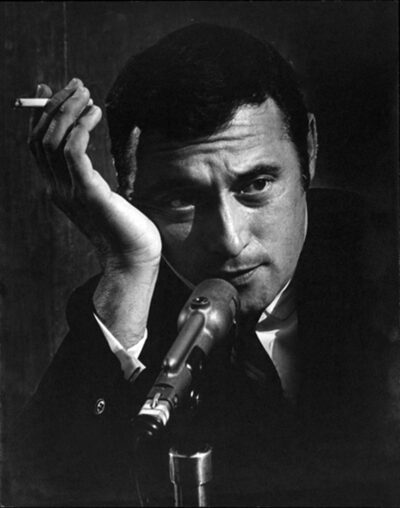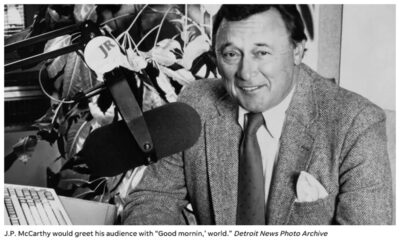Tribute Introduction The Voice of Detroit: J.P. McCarthy Echos a Legacy Made for Radio Broadcasting Before sunrise, as Detroit stirred to l
Tribute Introduction
The Voice of Detroit: J.P. McCarthy Echos a Legacy Made for Radio Broadcasting
Before sunrise, as Detroit stirred to life, one voice rose above the morning hum—warm, polished, and unmistakably familiar. For over three decades, J.P. McCarthy wasn’t just a radio host; he was the city’s trusted companion, its cultural compass, and its daily heartbeat. From the golden age of AM radio to the dawn of digital sound, McCarthy’s presence on WJR defined an era, shaped a community, and left a legacy that still reverberates through the Motor City and beyond.
Born in New York City in 1933 and raised in Detroit during wartime, McCarthy’s journey from Army recruit to Billboard’s “Top DJ” in 1966 is a testament to grit, grace, and the power of personality. His story is not just one of broadcast excellence—it’s a portrait of a man whose voice became synonymous with trust, tradition, and transformation in American radio.
This tribute, curated for the USA Radio Museum, honors J.P. McCarthy’s life, career, and cultural impact. Through archival recollections, personal milestones, and the voices of those who knew him best, we celebrate a broadcaster whose influence transcended the airwaves and became part of Detroit’s soul.
_____________________
Early Life & Military Service
Joseph Priestley McCarthy was born on March 22, 1933, in New York City—a metropolis teeming with voices, ambition, and the pulse of possibility. But it was in Detroit, not Manhattan, where his voice would ultimately find its home. In 1943, as World War II reshaped the American landscape, the McCarthy family relocated to the Motor City, joining thousands of others drawn by wartime industry and the promise of a new beginning. For young Joseph, the move marked the start of a lifelong bond with the city that would one day crown him its most beloved broadcaster.
McCarthy’s formative years unfolded in the working-class neighborhoods of Detroit’s east side. He attended Annunciation grade school, a modest Catholic institution where discipline and devotion were instilled early. Later, he enrolled at DeLasalle High School near City Airport, a place known for its rigorous academics and its proximity to the roar of engines—a fitting metaphor for the energy that would soon define his career. Even then, classmates recalled a young man with a quick wit, a natural charm, and a voice that carried.
In 1952, McCarthy began studies at the University of Detroit, but his academic path was soon interrupted by a call to service. At 19, he enlisted in the United States Army, trading textbooks for fatigues and finding himself stationed in Fairbanks, Alaska—a remote outpost where the cold was constant and the opportunities scarce. It was there, amid the snowdrifts and solitude, that McCarthy’s destiny took an unexpected turn.
Despite having no formal training in broadcasting, McCarthy maneuvered his way into a position at Armed Forces Radio. The assignment was strategic: it allowed him to avoid reassignment to a less desirable post. But what began as a tactical move quickly became a passion. Behind the microphone, McCarthy discovered something elemental—a sense of connection, a rhythm, a role that felt both natural and necessary. He wasn’t just reading scripts; he was speaking to soldiers, lifting spirits, and learning the cadence of companionship that would later define his morning shows.
Fairbanks may have been far from Detroit, but it was there that McCarthy’s voice began to take shape—not just in tone, but in purpose. The Army gave him discipline. Radio gave him direction. And together, they laid the foundation for a career that would span decades and touch millions.
Radio Beginnings – Flint & Rock and Roll
When J.P. McCarthy returned from military service in Alaska, he carried with him more than just the discipline of the Army—he brought back a newfound sense of purpose. Though his time at Armed Forces Radio had been brief and improvised, it awakened something elemental: a love for broadcasting and the realization that his voice could do more than fill silence—it could shape it.
Back in civilian life, McCarthy began exploring radio opportunities with the same quiet determination that would later define his career. He first tested the waters in Fairbanks, where the local stations offered limited reach but ample room for experimentation. It was a proving ground, a place to refine his instincts and learn the mechanics of the medium. But it wasn’t long before he set his sights on Michigan once again—this time, the city of Flint.
In the mid-1950s, Flint was a city in transition. The auto industry was booming, and with it came a surge of youth culture, music, and rebellion. Rock and roll was no longer a fringe phenomenon—it was the soundtrack of a generation. Elvis Presley, Bill Haley & His Comets, and the Everly Brothers were electrifying the airwaves, and McCarthy found himself at the center of it all. As a young disc jockey, he embraced the role with gusto, spinning records that made teenagers swoon and parents squirm.
But McCarthy was never just a “rock and roll DJ.” Even in those early days, his delivery carried a polish that set him apart. He wasn’t shouting over the music or chasing gimmicks—he was curating an experience. His voice had a cadence that suggested confidence without arrogance, warmth without affectation. Listeners didn’t just hear the songs; they heard McCarthy’s subtle commentary, his timing, his ability to make even the most raucous track feel like part of a larger conversation.
Flint was a stepping stone, but it was also a crucible. It taught McCarthy how to read a room he couldn’t see, how to connect with an audience he’d never met. It gave him the tools to navigate the shifting tides of popular culture while staying true to his own sensibilities. And perhaps most importantly, it confirmed what Fairbanks had hinted at: that radio wasn’t just a job for McCarthy—it was a calling.
By the time he left Flint, McCarthy had outgrown the role of local DJ. He was ready for something bigger, something more enduring. Detroit was calling, and WJR was waiting.
WJR & The Rise of a Legend
In 1958, J.P. McCarthy walked through the doors of WJR in Detroit—a station already steeped in prestige, known as “The Great Voice of the Great Lakes.” What followed was not merely a career move, but the beginning of a broadcast dynasty. Within months, McCarthy’s voice became a fixture on the airwaves, and within years, it became inseparable from the identity of the city itself.
WJR was a powerhouse, boasting a signal that reached across Michigan and into neighboring states. But it was McCarthy who gave that reach resonance. His early roles at the station included hosting both the “Morning Music Hall” and the “Afternoon Music Hall,” programs that blended music, commentary, and conversation with a signature ease. McCarthy didn’t just play records—he curated moods. His delivery was crisp but never cold, urbane but never aloof. He had the rare ability to sound both authoritative and approachable, a trait that would define his tenure.
In early 1963, McCarthy briefly left Detroit for a stint at KGO in San Francisco, a move that hinted at national ambitions. But the West Coast couldn’t hold him. By December 1964, he was back at WJR, reclaiming his morning slot and launching what would become one of the most enduring runs in American radio history. The “Morning Music Hall” evolved into a full-service morning show, blending news, interviews, music, and McCarthy’s own brand of conversational charm. Later, he added “Focus,” an afternoon interview program that showcased his skill as a listener as much as a host.
McCarthy’s rise was meteoric, but it was never flashy. He didn’t rely on stunts or controversy. Instead, he built trust—day by day, broadcast by broadcast. Commuters tuned in not just for headlines, but for companionship. Executives, factory workers, teachers, and retirees all found something familiar in his voice. He was the voice that greeted them in the morning, the voice that made sense of the day, the voice that never faltered.
By the mid-1960s, McCarthy’s dominance was undeniable. In July 1966, Billboard named him “Top DJ,” a national recognition that confirmed what Detroit had long known. His ratings were unmatched, his influence unrivaled. But McCarthy remained grounded. He understood that radio was a relationship, not a performance. He spoke to his audience, not at them. And in doing so, he became more than a broadcaster—he became a ritual.
Behind the scenes, McCarthy was meticulous. He prepared thoroughly, read voraciously, and surrounded himself with producers and staff who shared his commitment to excellence. Yet he never lost the spontaneity that made his broadcasts feel alive. Whether interviewing politicians, authors, or everyday Detroiters, McCarthy brought out the best in his guests—because he genuinely cared.
WJR gave McCarthy a platform. McCarthy gave WJR a soul. Together, they shaped the soundscape of Detroit for a generation, creating a legacy that would endure long after the final sign-off.
“Good Mornin’, World!”
 Every morning, just after the swell of Artie Shaw’s “Begin the Beguine” or the brassy optimism of Count Basie’s “Have a Nice Day,” J.P. McCarthy would lean into the mic and offer a simple, jubilant greeting: “Good Mornin’, World!” It wasn’t just a catchphrase—it was his morning greeting J.P. instituted in a most profound way. Whatever the headlines held, whatever the weather brought, Detroit had a voice it could count on. For over thirty years, that voice was the city’s compass, its comfort, its rhythm.
Every morning, just after the swell of Artie Shaw’s “Begin the Beguine” or the brassy optimism of Count Basie’s “Have a Nice Day,” J.P. McCarthy would lean into the mic and offer a simple, jubilant greeting: “Good Mornin’, World!” It wasn’t just a catchphrase—it was his morning greeting J.P. instituted in a most profound way. Whatever the headlines held, whatever the weather brought, Detroit had a voice it could count on. For over thirty years, that voice was the city’s compass, its comfort, its rhythm.
And though the broadcasts have long since ceased, in Detroit—and in the hearts of those who knew him—J.P. McCarthy’s morning voice never truly faded. It lingers still, like the echo of a sunrise that once greeted the city with grace. His legacy lives not only in the sound archives and accolades, but in the emotional memory of a community that woke up with him, trusted him, and loved him.
At the USA Radio Museum, we preserve that echo. We honor the man who didn’t just speak to Detroit—he spoke for it. And in doing so, he became part of its essence and the city’s soul.
WJR Radio 760 | J. P. McCarthy | St. Patrick’s Day Show | March 17, 1993
Audio Digitally Remastered by USA Radio Museum
From the Golden Tower: WJR’s Home in the Sky
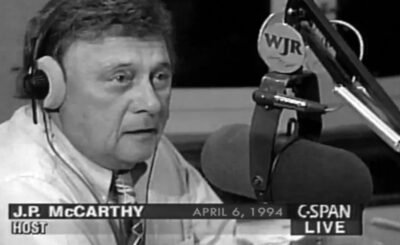 High above the city, on the 7th and 8th floors of Detroit’s Fisher Building, a voice rose each morning that would become the heartbeat of a generation. WJR Radio 760, known as “The Great Voice of the Great Lakes,” broadcast from this Art Deco masterpiece—its signal reaching across 38 states, its spirit rooted in the Motor City.
High above the city, on the 7th and 8th floors of Detroit’s Fisher Building, a voice rose each morning that would become the heartbeat of a generation. WJR Radio 760, known as “The Great Voice of the Great Lakes,” broadcast from this Art Deco masterpiece—its signal reaching across 38 states, its spirit rooted in the Motor City.
WJR carried J.P. McCarthy’s voice across 38 states, becoming a ritual of morning radio and a symbol of civic grace.
The Fisher Building, designed by Albert Kahn and completed in 1928, was more than a headquarters. It was a symbol of elegance, ambition, and architectural grandeur. And from its golden tower, J.P. McCarthy greeted Detroit with his signature phrase: “Good Mornin’, World!”
That greeting, delivered just after the swell of “Begin the Beguine” or the brassy burst of “Have a Nice Day,” wasn’t just a show opener—it was a ritual. A sonic sunrise. A promise that the day ahead would be met with grace, curiosity, and companionship.
For over thirty years, McCarthy’s voice echoed from the Fisher Building’s heights, becoming part of the city’s rhythm. The phrase “From the Golden Tower of the Fisher Building…” wasn’t just a station ID—it was a declaration of presence, pride, and permanence.
Today, the USA Radio Museum honors not only the man behind the mic, but the place that gave his voice its wings. The Fisher Building remains a monument to Detroit’s golden age of broadcasting—and J.P. McCarthy, its most enduring echo.
_____________________
WJR Radio 760 | The J. P. McCarthy Show | April 6, 1994
Audio Digitally Remastered by USA Radio Museum
ABOUT THIS AIRCHECK: C-SPAN televised the J. P. McCarthy Morning Show in its entirety (4 hours) on April 6, 1994, 31 years ago.
Throughout this entire show, you will hear the voices of Gene Fogel, Dan Streeter, Dick Heifner, Joel Alexander, Dennis Nuebacher, with the day’s news, traffic, weather and sports. And of course, J.P. speaking with guests and taking calls throughout the broadcast.
At time this broadcast was simulcast on C-SPAN, J. P. McCarthy was at WJR for 27 years. The WJR morning ‘voice of the Great Lakes’ passed away on August 16, 1995. J. P. was 62.
_____________________
Cultural Impact & Industry Recognition
By the mid-1960s, J.P. McCarthy was no longer just a radio personality—he was a cultural institution. His morning show on WJR had become a ritual for Detroiters, a sonic anchor in a city constantly in motion. Whether navigating the icy streets of winter or the tensions of social change, listeners turned to McCarthy not only for news and music, but for reassurance. His voice was steady, his tone measured, his presence unwavering.
In July 1966, Billboard magazine named McCarthy “Top DJ” in the country—a rare honor for a broadcaster whose style was more conversational than flamboyant. While others chased trends and ratings with shock and spectacle, McCarthy built his empire on trust. He didn’t need gimmicks. He had gravitas.
His influence extended far beyond the studio walls. Politicians, authors, and celebrities considered a McCarthy interview a rite of passage. Governors and senators sought his ear. Bestselling authors timed their book tours around his show. And when McCarthy spoke, Detroit listened—not just because he was popular, but because he was credible.
In 1992, McCarthy was inducted into the National Radio Hall of Fame, becoming the first Detroit broadcaster to receive the honor. It was a moment of national recognition for a man who had spent his career elevating local voices. The award acknowledged not just his longevity, but his artistry—the way he could turn a morning commute into a masterclass in civility, curiosity, and connection.
He was also a recipient of multiple Marconi Awards, the broadcasting industry’s highest honor. Yet McCarthy never let accolades define him. He remained focused on the work: the preparation, the pacing, the pursuit of excellence. His humility was as consistent as his ratings.
But perhaps the most telling measure of McCarthy’s impact was the way Detroit responded to him—not with fanfare, but with affection. He was the voice that accompanied generations through graduations, elections, snowstorms, and sunrises. He was the soundtrack of the city’s resilience.
In an era when radio was evolving rapidly—when FM was rising, formats were fragmenting, and talk radio was growing louder—McCarthy remained a beacon of consistency. He didn’t chase trends; he set standards. And in doing so, he helped define what radio could be: not just entertainment, but a public service, a cultural mirror, a daily act of companionship.
Final Years & Legacy
By the early 1990s, J.P. McCarthy had become more than a broadcaster—he was a fixture of Detroit’s daily rhythm, a voice so familiar it felt like family. His morning show continued to dominate the ratings, and his presence on WJR remained as vital as ever. But behind the scenes, McCarthy was quietly facing a battle that no microphone could soften.
In the late spring of 1995, McCarthy was diagnosed with myelodysplastic syndrome, a rare blood disorder often considered a precursor to leukemia. True to form, he met the diagnosis with dignity and discretion. He continued to broadcast, never allowing illness to overshadow the work. For McCarthy, radio had always been about others—the guests, the listeners, the city. Even in his final months, he kept the focus outward.
On August 16, 1995, J.P. McCarthy passed away peacefully in his sleep, surrounded by his family. He was 62 years old. The news sent a wave of sorrow through Detroit, a city that had come to rely on his voice not just for information, but for comfort. In homes, offices, and cars across the region, silence fell—not just in mourning, but in reverence.
The tribute that followed was unprecedented. On the eve of his funeral, 28 Detroit radio stations observed a simultaneous moment of silence in his honor. It was a gesture as profound as it was rare—a citywide pause to acknowledge the passing of a man who had never asked for attention, but had earned every ounce of it. For one minute, the airwaves he had once filled with warmth and wit went quiet, allowing the weight of his absence to settle in.
Colleagues remembered him not only as a consummate professional, but as a generous mentor and a loyal friend. Listeners shared stories of how his voice had accompanied them through life’s milestones—first jobs, morning drives, heartbreaks, and triumphs. His impact was personal, intimate, and enduring.
McCarthy’s legacy lives on not just in archives and accolades, but in the ethos he embodied. He proved that radio could be elegant, that conversation could be civil, and that connection could be cultivated one morning at a time. He didn’t chase fame; he built trust. And in doing so, he became irreplaceable.
_____________________
Neil Rubin: Hearing from J.P. McCarthy One Last Time
In this poignant 2016 column for The Detroit News, Neal Rubin reflects on the legacy of J.P. McCarthy ahead of the Detroit Public Television documentary “J.P. McCarthy — The Voice of Detroit.” Through interviews with McCarthy’s son Jamie, his widow Judy, and former colleagues, the piece paints a portrait of a man whose voice once defined Detroit mornings. From presidential interviews to everyday kindness, McCarthy’s reach was vast—but his humility, neutrality, and grace were what truly set him apart. Even decades later, his memory evokes tears, gratitude, and a sense of civic intimacy that few broadcasters ever achieve.
You can read the full column on The Detroit News website, HERE.
_____________________
Conclusion – The Echo That Remains
Long after the final broadcast faded into static, J.P. McCarthy’s voice continues to echo—not through speakers, but through memory. It lives in the quiet moments of morning routines, in the cadence of conversation, in the way Detroiters still speak of him with a kind of reverent shorthand: “J.P.” That was all you needed to say.
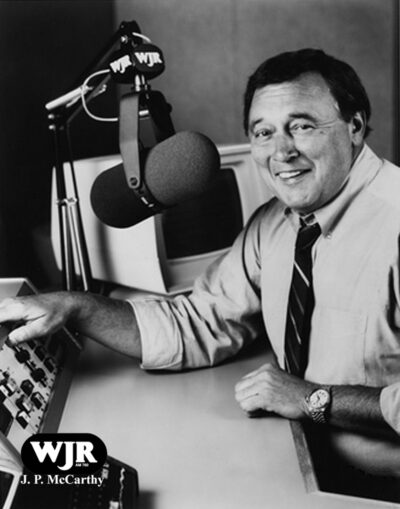 His legacy is not just preserved in archives or awards, but in the emotional architecture of a city that trusted him implicitly. He was the voice that made sense of the day before it began. The voice that asked questions with curiosity, not confrontation. The voice that reminded us, day after day, that civility and connection were not relics—they were choices.
His legacy is not just preserved in archives or awards, but in the emotional architecture of a city that trusted him implicitly. He was the voice that made sense of the day before it began. The voice that asked questions with curiosity, not confrontation. The voice that reminded us, day after day, that civility and connection were not relics—they were choices.
McCarthy didn’t chase fame. He earned affection. He didn’t perform. He conversed. And in doing so, he redefined what radio could be—not a platform for noise, but a sanctuary for thought, warmth, and grace.
At the USA Radio Museum, we honor J.P. McCarthy not only as Detroit’s most iconic broadcaster, but as a national treasure whose influence transcended geography. His story is a reminder that the most powerful voices are not always the loudest—they are the ones that listen, the ones that linger, the ones that become part of who we are.
And so, we preserve his legacy not just in sound bites, but in spirit. In the belief that storytelling matters. That morning radio can be art. That one voice, offered with sincerity and care, can shape the soul of a city.
J.P. McCarthy signed off for the last time in August 1995. But in Detroit, and in the hearts of those who knew him, the broadcast never truly ended, despite his passing, thirty years ago.
Beneath the golden towers of the Fisher building, where his voice once rose with the dawn, J.P. McCarthy’s presence remains.
He was the morning rise for over thirty years—his voice a trusted companion to millions. And although he’s been gone almost as long as he was on WJR, his echo still lingers in the quiet corners of Detroit’s memory, a city awakened sometime after 6:00 in the morning by the familiar sound of his voice: “Good Mornin’, World!”
Never forgotten. Always remembered.
_____________________
A USARM Viewing Tip: On your PC? Mouse/click over each image for expanded views. On your mobile or tablet device? Finger-tap all the above images inside the post and stretch image across your device’s screen for LARGEST digitized view. Then click your brower’s back arrow to return to the featured post.

